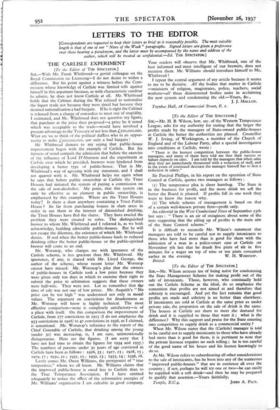LETTERS TO THE EDITOR
[Correspondents are requested to keep their letters as brief as is reasonably possible. The most suitable length is that of one of our " News of the Week" paragraphs. Signed letters are given a preference over those bearing a pseudonym, and the latter must be accompanied by the name and address of the author, which will be treated as confidential.—Ed. THE SPECTATOR.] THE CARLISLE EXPERIMENT [To the Editor of THE SPECTATOR.]
SIR,—With Mr. Frank Whitbread—a genial colleague on the Royal Commission on Licensing—I do not desire to widen a difference. But his point against a witness before the Com- mission whose knowledge of Carlisle was limited tells against himself in this argument because, as with characteristic candour he admits, he does not know Carlisle at all. Mr. Whitbread holds that the Cabinet during the War refused to nationalise the liquor trade not because they were timid but because they deemed nationalisation a bad bargain. If he is right the Cabinet is released from a charge of cowardice to meet one of stupidity.
I estimated, and Mr: Whitbread does not question my figure, that purchase at the price then proposed—a price be it noted which was acceptable to the trade—would have involved a present advantage to the Treasury of not less than ,C5oo,000,000. What are we to think of the political duffers who in an oppor- tunity to make L500,000,000, saw only a bad bargain !
Mr. Whitbread demurs to my saying that public-house improvement began with the example of Carlisle. But his fairness of mind compels the admission that before the exercise of the influence of Lord D'Abernon and the experiment at Carlisle over which he presided, brewers were hindered from developing a better type of public-house. That is Mr. Whitbread's way of agreeing with my statement, and I shall not quarrel with it. Mr. Whitbread helps me again when he says that before public ownership at Carlisle the Trust Houses had initiated the system of paying a commission on the sale of non-alcoholics. My point, that this system can only be effective as an element in public ownership, is emphasised by this example. Where are the Trust Houses today? Is there a slum anywhere containing a Trust Public House ? So far from purchasing houses in slum areas in order to use them in the interest of diminished drinking, the Trust Houses have fled the slums. They have evaded the problem they were created to solve. The distinguished brewer to whom Mr. Whitbread and I referred is, as we both acknowledge, building admirable public-houses. But he will not escape the dilemma, the existence of which Mr. Whitbread denies. If and when the better public-house leads to reduced drinking either the better public-house or the public-spirited brewer will come to an end.
Mr. Worsnop, who charges me with ignorance of the
Carlisle scheme, is less gracious than Mr. Whitbread. My ignorance, if any, is shared with Mr. Lloyd George, the author of the scheme, whose recent letter Mr. Worsnop cannot have missed. Mr. Worsnop's plea that the owners of public-houses in Carlisle took a low price because they were given only ten days in which to exercise their right to submit the price to arbitration suggests that these owners were half-wits. They were not. Let us remember that the time of sale was not one of low prices. Mr. Asquith's " No price can be too high " was understood not only in moral values. The argument on convictions for drunkenness as Mr. Worsnop will know is highly technical. The most effective comparison—none is completely satisfactory—is of a place with itself. On this comparison the improvement of Carlisle, from 277 convictions in 1915 (I do not emphasise the 953 convictions in 1916) to 47 convictions in 1936, as I claimed, is sensational. Mr. Worsnop's reference to the report of the Chief Constable of Carlisle, that drinking among the young (under 3o) was increasing, is, I am sure, unintentionally disingenuous. Here are the figures. (I am sorry that I have not had time to obtain the figures for 1934 and 1935) The numbers of persons under 3o years of age convicted in
Carlisle have been as follows : 1926, 33 ; 1927, 23 ; 1928, ts ;
1929, 17 ; 1930, 21 ; 1931, 15 ; 1932, 13 ; 1933, 14 ;
1936, r6.
Lastly comes Mr. Owen Williams, the protagonist of " true temperance," whom we all know. Mr. Williams claims that the improved public-house is owed less to Carlisle than to the True Temperance Association. If I have omitted adequately to notice the effect of the reformative energies of Mr. Williams' organisation I am culpable in good company. Your readers will observe that Mr. Whitbread, one of the best informed and most intelligent of our brewers, does not mention them. Mr. Williams should introduce himself to Mr.
Whitbread !
I repeat the central argument of my article because it seems to me to be decisive. All the bodies that matter in Carlisle —ministers of religion, magistrates, police, teachers, social workers—all these disinterested bodies unite in acclaiming the new system and condemning the old.—Yours, &c., Toynbee Hall, 28 Commercial Street, E. r. J. J. MALLON.














































 Previous page
Previous page